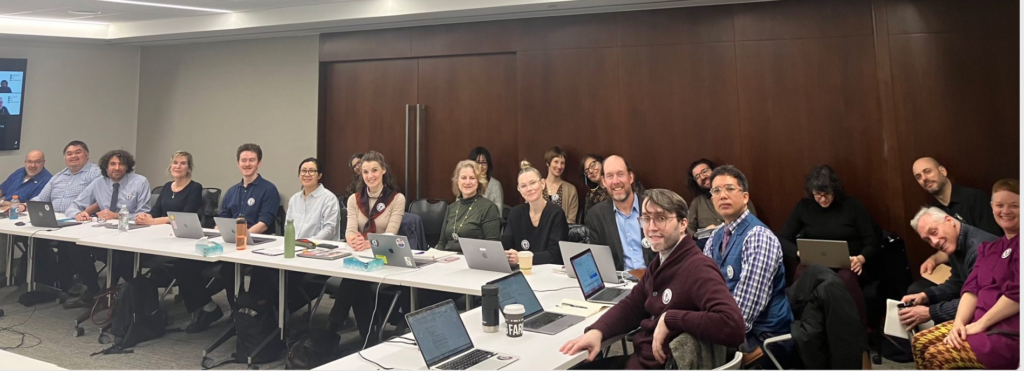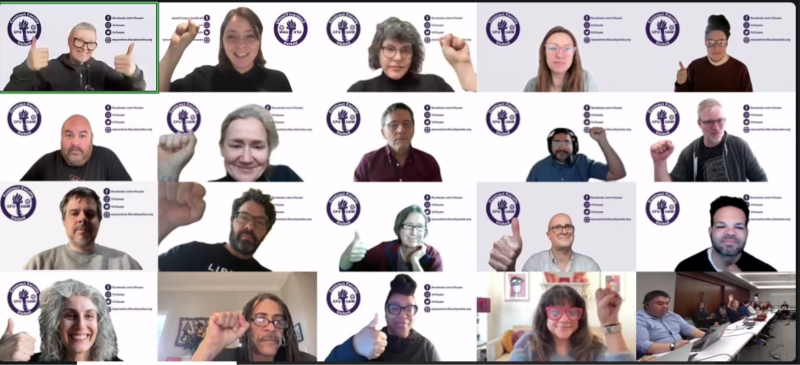Watch the most recent Bargaining blog video update here!
Yesterday afternoon your elected bargaining committee held our fourth bargaining session with the NYU administration. As always, you can follow our progress towards a strong first contract by email, on the bargaining blog on our CFU-UAW website, and on the bargaining tracker. And you can observe bargaining directly in person or by zoom – RSVP here to join our next session!

The bargaining session began at 10:20 a.m. when the administration’s team arrived. The bargaining committee, our in-person observers, and the observers on Zoom were waiting (since before the intended start time of 10:00 a.m.) and ready to go. First order of business: advising the administration that due to their late arrival and the amount of work we wanted to accomplish, we would need to extend the session until at least 1:20.
Once that was established, we immediately asked for status updates on still outstanding RFI’s (Requests for Information) that the administration is obligated to provide. There was some progress here, with the administration stating they will provide most additional information sometime in January.
Next, we asked them for their responses to the 7 articles we proposed at the last meeting. They stated that there are already university policies on Job Postings, Personnel Files, and PI Status. The bargaining committee’s response: we are bargaining to improve university policies. The Personnel Files proposal, for example, is designed to keep pace with rapid changes in data privacy and protection for which current policy does not account.
The administration spent a great deal of time trying to explain to us why they believe current policy around PI Status — in which we must ask for permission from our dean to be principal investigators on grants or for human subjects research — is sufficient. They argued that research is not part of contract faculty members’ job responsibilities (!) and that granting automatic PI status eligibility to all contract faculty members would infringe upon management’s right to set job responsibilities. Needless to say, we disagree with their arguments and will continue the fight for this fundamental right.
They asked many clarifying questions about our proposal for Union-Management Committees, which we answered. They agreed to the need for our proposal on Severability, but did not agree to our language. We expect to receive counterproposals at our next bargaining session. They advised us that they will wait until we reach agreement on our eventual contract to respond to our proposal that the Faculty Handbook will be updated to be consistent with the eventual contract. Next, they rejected our proposed article on Successorship, which would ensure that should a school, department, or other unit of the university be sold, spun off, or merged with another institution (as has happened several times in the last century), the contract we are bargaining would still apply for affected members. We will continue to explore ways to protect our membership from these types of circumstances.
They next returned to continued discussions about the Recognition article, which we introduced in session 2. We have come closer on some language to enshrine the bargaining unit we worked hard to win in our election neutrality agreement, and expect a written counterproposal at our next session.
We then proposed six new articles and two counterproposals:
- Academic Freedom – This provision builds on and expands the AAUP/AAC&U Statement on Academic Freedom to protect contract faculty members’ rights to academic freedom in the classroom, in service to the university and our professions, and as members of the community. It extends the principles of academic freedom to apply to our roles as researchers, teachers, artists and professionals.
-
Shared Governance – This article keeps current policy on faculty governance and ensures that contract faculty are considered full members of the faculty.
-
Health and Safety – We proposed that the Administration will provide a safe and healthy work environment and would not require a contract faculty member to work under conditions that pose a threat to their health and safety.
-
Grievance and Arbitration – This article offers a clear procedure for adjudicating disputes.
-
NLRA Principles – This proposal adopts what we already agreed to in the Election and Neutrality Agreement and directs an arbitrator to use the standards of the National Labor Relations Act to legal questions that the parties present.
-
Discipline, Suspension and Discharge – This article clarifies that contract faculty members cannot be discharged, suspended or disciplined except for just cause and lays out procedures.
-
Union Rights and Access (counterproposal) – We handed a counterproposal which addresses issues the administration raised in our previous bargaining session, including a suitable timeline in which we would receive bargaining unit information, and the scope of this information. This article would ensure that the union has the information, space, time, and resources required to service our contract in the future.
-
Interim Grievance Committee (counterproposal) – The administration had previously proposed that bargaining unit contract faculty should be removed from grievance and disciplinary committees during the bargaining period. They did not explain how these committees would function. We shared a counterproposal and also a Letter to the Provost, signed by a supermajority of bargaining members who were elected to serve on the 2023-24 and/or 2024-25 grievance committees, along with tenured professors who served or are serving on grievance committees. The letter was sent to the Provost on December 18, 2024. We also submitted the Continuing Contract Faculty Senators Council’s resolution that demanded that contract faculty not be removed from these committees.
Our next two bargaining sessions will be held on Fridays: January 17 from 10am to 1pm, and January 31 from 1 to 4pm. We hope to propose the last of the non-economic articles, respond to the administration’s counterproposals, and get started on economic proposals. Join us in person or on Zoom to demonstrate to the administration that they are not just negotiating with your eleven elected representatives, but with the entire NYU contract faculty. Show them how serious we are about negotiating a strong first contract! RSVP here to observe bargaining sessions.
As always, sign up here to tell us you want to get involved in fighting for one or more of our 13 bargaining goals. The more of us who participate, the more power we have to win meaningful improvements to our experience!

Observers on zoom discussing why we want a strong first contract ahead of our bargaining session!
Wishing you all the best over the holiday season!
In solidarity,
Contract Faculty United – UAW Bargaining Committee
Heidi White (Liberal Studies)
Fanny Shum (Mathematics, Courant Institute)
Jamie Root (French Literature, Thought and Culture, Arts & Science)
Chris Chan Roberson (Undergraduate Film & TV, Tisch)
Jacob Remes (Gallatin School of Individualized Study)
Benedetta Piantella (Technology, Culture, and Society, Tandon)
Peter Li (General Engineering, Tandon)
Elisabeth Fay (Expository Writing Program, Arts & Science)
Thomas Hill (Center for Global Affairs, SPS)
Robin Harvey (Teaching and Learning, Steinhardt)
Richard Dorritie (Rory Meyers College of Nursing)
